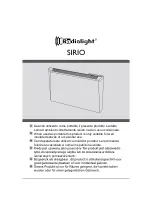
9
refrigerants, swimming pool chemicals, water softener chemicals,
calcium and sodium chloride, waxes, and process chemicals are
typical compounds which are potentially corrosive. These materials
are corrosive at very low concentration levels with little or no odor to
reveal their presence.
Products of this sort should not be stored near the heater. Also, air
which is brought in contact with the water heater should not contain
any of these chemicals. If necessary, uncontaminated air should be
obtained from remote or outside sources.
cIrculatInG puMp
Field installed circulating pumps should be of all bronze
constructions.
To optimize the total storage capacity of a horizontal vessel,
particularly under low draw conditions, it is recommended to utilize a
pump and recirculation line sized to turn the entire storage capacity
of the tank once each hour (i.e., a 600 gallon tank would require a
10 gpm pump).
InsulatIon Blankets
Insulation blankets are available to the general public for external use
on electric water heaters but are not necessary with this product. The
purpose of an insulation blanket is to reduce the standby heat loss
encountered with storage tank heaters. Your water heater meets or
exceeds the EPACT and ASHRAE/IES 90.1 standards with respect
to insulation and standby loss requirements, making an insulation
blanket unnecessary.
Should you choose to apply an insulation blanket to this heater, you
should follow these instructions below. Failure to follow these instruc
-
tions can result in fire, serious personal injury, or death.
• Do not cover the temperature and pressure relief (T & P) valve
with an insulation blanket.
• Do not cover the instruction manual. Keep it on the side of the
water heater or nearby for future reference.
• Do obtain new warning and instruction labels for placement on
the blanket directly over the existing labels.
teMperature-pressure relIef ValVe
A.O. Smith Water Products Company has provided this water heater
with a properly certified temperature & pressure relief valve.
The valve is certified by a nationally recognized testing laboratory
that maintains periodic inspection of production of Listed equipment
of materials as meeting the requirements for Relief Valves for Hot
Water Supply Systems, ANSI Z21.22 and the ASME code.
If replaced, the valve must meet the requirements of local codes,
but not less than a combination temperature and pressure relief
valve certified as indicated in the above paragraph. Contact the
A.O. Smith Customer Care Center for replacement
temperature & pressure relief valves 800-527-1953.
The valve must be marked with a maximum set pressure not to
exceed the marked hydrostatic working pressure of the water heater
(150 psi = 1,035 kPa) and a discharge capacity not less than
the water heater input rate as shown on the model rating plate.
The temperature setting of the relief valve should not exceed
210°F.
For safe operation of the water heater, the relief valve must
not
be removed from its designated opening nor plugged.
The temperature-pressure relief valve must be installed directly
into the fitting of the water heater designed for the relief valve.
Provide tubing so that any discharge will exit only within 6 inches
(153 mm) above an adequate drain or external to the building
or structure. Be certain that no contact is made with any live
electrical part. The discharge opening must
not
be blocked
or reduced in size under any circumstances. Excessive length,
over 30 feet (9.14 m), or use of more than four elbows can cause
restriction and reduce the discharge capacity of the valve.
Do
not
place shut-off valve or other obstruction between the
temperature-pressure relief valve and the tank. Relief valve
discharge piping must be provided by the installer. The discharge
tube must be threaded directly into the relief valve opening
and routed to the nearest drain. There cannot be any valves
or obstructions in the discharge piping and excessive lengths
should be avoided. Improper installation of the relief valve
discharge tubing can result in system failure, property damage,
injury, or death.
Once the water heater is installed and filled with water, check
the operation of the temperature-pressure relieve valve. Follow
the instructions in the Maintenance section of this manual, see
Page 15.
If after manually operating the valve it fails to completely reset
and continues to release water, immediately close the cold water
inlet to the water heater, follow the “Draining” instructions and
replace the temperature-pressure relief valve with a properly
rated/sized new one.
Summary of Contents for DVE-150, DHE-200
Page 5: ...5 dimensions and capacities data...
Page 11: ...11 electrical and recoveries data TABLE 2...
Page 19: ...19 NOTES...
Page 20: ...20 www aosmithwaterheaters com...






































